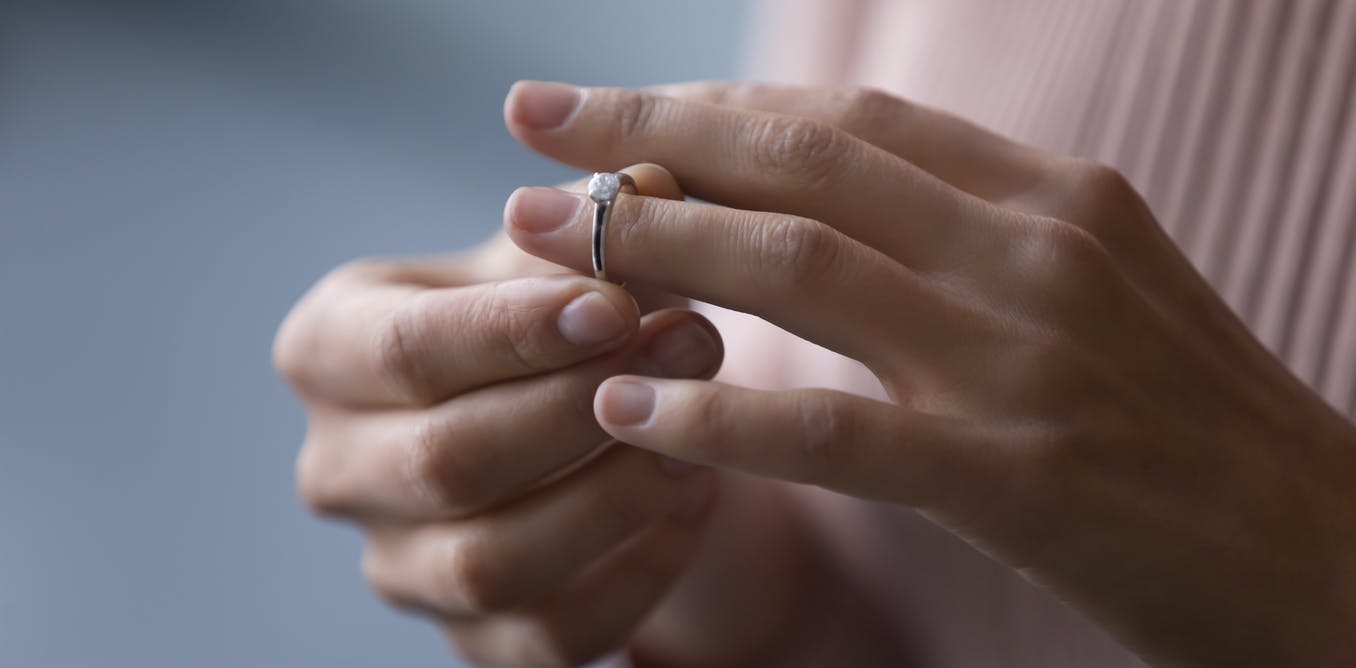The impact of Christian purity culture is still being felt – including in Britain

fizkes/Shutterstock
In the 1990s and 2000s, a Christian movement now known as “purity culture” reached its height. Purity culture was most significant in America, and since the noughties, it has gradually faded from cultural prominence. Its impact, though, is global and ongoing.
Purity culture was built on an established religious ethic: sexual abstinence until marriage. But it came to encompass a subculture in American evangelical Christianity centred around maintaining “sexual purity”.
During this period, a prolific industry of purity-themed bibles, rallies and books emerged. Sales of purity rings increased, worn as a symbol of commitment to sexual purity. Purity pledges were signed by teenagers and young adults to demonstrate their vow of abstinence.

This article is part of Quarter Life, a series about issues affecting those of us in our twenties and thirties. From the challenges of beginning a career and taking care of our mental health, to the excitement of starting a family, adopting a pet or just making friends as an adult. The articles in this series explore the questions and bring answers as we navigate this turbulent period of life.
You may be interested in:
Birth control: what to expect if you choose to come off it
Wagatha Christie: what the Vardy v Rooney case can teach you about avoiding libel on social media
Cluttercore: Gen Z’s revolt against millennial minimalism is grounded in Victorian excess
Beyond abstinence, young Christians were encouraged not to date. Romantic attachments not leading to marriage were discouraged due to a perceived risk of emotional and physical impurity. Young women and girls were instructed to be careful how they dressed and interacted with others to avoid “tempting” men, and strict gender roles were encouraged.
In recent years, it has been shown that purity culture is harmful. It taught women in particular to be suspicious and ashamed of their bodies, and resulted in anxiety, panic attacks and even PTSD.
Though purity culture is considered a US phenomenon, it had an international reach. My PhD research shows that purity culture was also influential in Britain. This was in part due to transatlantic transmission of American Christian purity ideals, but also due to a concurrent intensifying concern about sexual abstinence and gender roles in British Christianity. My research suggests that the effects of purity culture in Britain persist.
Rebranding a movement
The identifiable rituals of purity culture – such as purity rings and pledges – have receded. But key organisations are rebranding themselves and changing the way purity culture is presented.
True Love Waits was an organisation launched in 1993 that distributed purity pledge cards. Now, a new bible study promoting sexual purity is “reintroducing True Love Waits” to the next generation. The study is written by Sean McDowell, son of US purity culture patriarch Josh McDowell.
Purity ring organisation Silver Ring Thing has also recently remarketed as Unaltered Ministries, dropping its focus on purity rings but nonetheless holding on to its heritage.
Alongside this, new brands which recycle purity messaging are also emerging. Take, for example, GirlDefined – a YouTube channel run by two sisters promoting “biblical womanhood”.
Both sisters waited until marriage to kiss their husbands and describe feminism as an “attack on God’s design for womanhood”.
Though these brands are from the US, there is an important difference between them and those of the nineties and early noughties: they are all now predominantly online. They are therefore much more easily accessible around the world. Participants in my PhD research from Britain were invited to share what resources they use on the bible and Christian living. Many of them noted figures from the US, including Girl Defined.
Ongoing impact
My research with participants shows that purity culture endures in Britain in two ways: in its continuing influence over Christian teaching on gender and sexuality, and in the bodies of people who experienced it.
The permeation of purity culture into church teachings and cultures can be seen in anxieties around male-female friendships, relationship expectations, the Christian idolisation of marriage, the equation of virginity with value, and inferences that women are responsible for gatekeeping men’s sexual behaviour.
Meanwhile, former purity culture adherents are grappling with its after-effects. Many have spent years analysing how purity teachings affected their view of their body and relationships with other people. Women have described feeling trapped in their own skin. Purity culture endures in the memories, bodies, relationships and trauma of those who were raised within it.

Reverse side of True Love Waits purity pledge card which belonged to a young Christian in Britain.
Without the noticeable rituals and well-known brands characteristic of purity culture, its persistence is much harder to spot. It therefore poses a greater risk. Purity culture in this form is less identifiable and more covert. Unaltered Ministries and GirlDefined are initially unrecognisable as purity culture. So too are the ways in which purity messages have been subsumed into Christian culture.
There is increasing critical reflection on purity culture. An apology from former purity culture poster boy Joshua Harris for the negative effect of his book I Kissed Dating Goodbye brought the reappraisal of this movement into the public eye. And campaigner Emily Joy Allison has written on the connection between purity culture and abuse.
But the normalised remnants of purity culture are yet to fully be acknowledged. The repackaging of purity culture into new formats, and its permeation into broader Christian culture means the movement persists – including in Britain.

Chrissie Thwaites receives funding from the Arts and Humanities Research Council via the White Rose College of Arts and Humanities.







